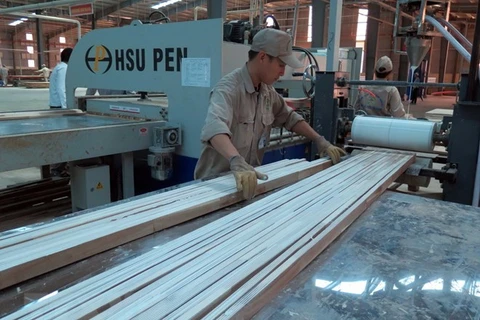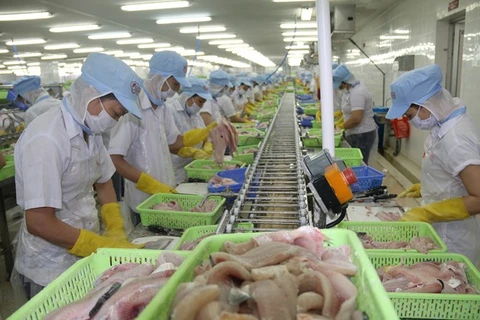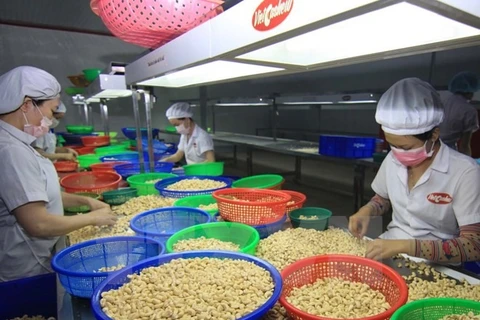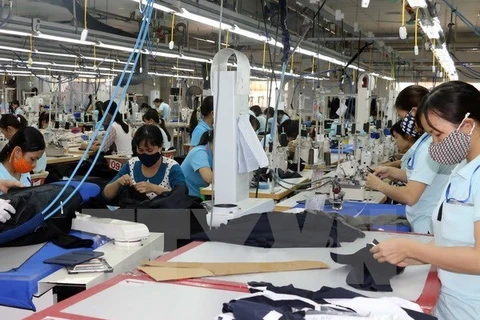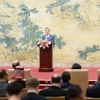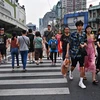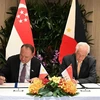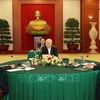Jakarta (VNA) - As the US and China are locked in a trade spat through mutual hiking of tariffs, Indonesia looks likely to be dragged into what may escalate into a global trade war.
Experts of the East Asia Summit said that in a bid to address the trade surplus of around 9 billion USD enjoyed by Indonesia against the US, President Donald Trump reportedly wants to revoke the special tariffs his country applies to Indonesian products, especially in textiles, which is bound to be detrimental to the Indonesian economy.
Despite not ruling out retaliatory tariffs, Indonesian Trade Minister Enggartiasto Lukita said he would first prioritise trade diplomacy. In contrast, those in the textile industry want to see a more militant approach.
Chairman of the Indonesian Textile Association Ade Sudrajat told the Jakarta Globe news outlet that if a higher tariff is imposed, it will create a huge obstacle for the textile industry, which must be countered. He suggested that Indonesia could use its sizeable imports of US agricultural produce as a bargaining chip, given that American soybeans make up about 70 percent of the national consumption.
However, experts said imposing a high import duty on soybeans would naturally result in price hikes for its derivative products, thus affecting local lives. With the national legislative and presidential elections coming up next year in Indonesia, the Government will without fail try to curb inflation, especially for daily staples, as best as it can.
Indonesian authorities have taken diplomatic endeavours to deal with difficulties, negotiating with the US government at all levels and pursuing a multilateral effort through ASEAN to maximise trade diplomacy with the US.
The current US-China trade showdown is estimated to result in a cascading effect throughout Asia as goods made in China, electronics for instance, often incorporate components manufactured elsewhere on the continent, notably in the Southeast Asian countries of Thailand, Vietnam, and Malaysia. A full-blown trade war between the world’s two biggest economies may also see global trade traffic decimated, affecting port cities like Singapore. -VNA
Experts of the East Asia Summit said that in a bid to address the trade surplus of around 9 billion USD enjoyed by Indonesia against the US, President Donald Trump reportedly wants to revoke the special tariffs his country applies to Indonesian products, especially in textiles, which is bound to be detrimental to the Indonesian economy.
Despite not ruling out retaliatory tariffs, Indonesian Trade Minister Enggartiasto Lukita said he would first prioritise trade diplomacy. In contrast, those in the textile industry want to see a more militant approach.
Chairman of the Indonesian Textile Association Ade Sudrajat told the Jakarta Globe news outlet that if a higher tariff is imposed, it will create a huge obstacle for the textile industry, which must be countered. He suggested that Indonesia could use its sizeable imports of US agricultural produce as a bargaining chip, given that American soybeans make up about 70 percent of the national consumption.
However, experts said imposing a high import duty on soybeans would naturally result in price hikes for its derivative products, thus affecting local lives. With the national legislative and presidential elections coming up next year in Indonesia, the Government will without fail try to curb inflation, especially for daily staples, as best as it can.
Indonesian authorities have taken diplomatic endeavours to deal with difficulties, negotiating with the US government at all levels and pursuing a multilateral effort through ASEAN to maximise trade diplomacy with the US.
The current US-China trade showdown is estimated to result in a cascading effect throughout Asia as goods made in China, electronics for instance, often incorporate components manufactured elsewhere on the continent, notably in the Southeast Asian countries of Thailand, Vietnam, and Malaysia. A full-blown trade war between the world’s two biggest economies may also see global trade traffic decimated, affecting port cities like Singapore. -VNA
source

